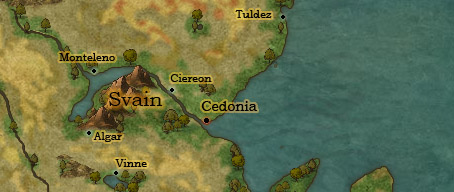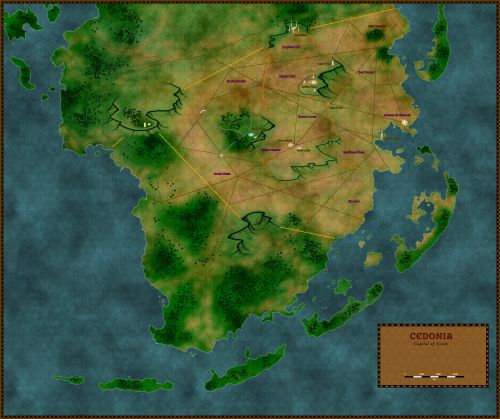Svain
The Kingdom of Svain lies in the northeastern region of the Orelean Continent. Composed primarily of marshy wetlands and rolling hills, the fertile lands were ripe for exploitation by civilized races. Formally recognized in 154 A.E., The Kingdom of Svain begain as a colony of the Turathi Empire. One of the first intercontinental colonies, Svain would prove to be the doom to its homeland in time, for reasons still speculated upon by scholars today.
Current Relations
The Kingdom of Svain currently enjoys an uneasy peace with its southern neighbor, the Imperial Dynasty of Xianlian. Closer to home, the gnoll hordes of the Howling Savannah plague much of Svain’s western borders, and have contained their recent ambitions at expansion. Lastly, pockets of Escabla raiders have dotted Svain’s northern borders, drawing any remaining military defenses away from the heartland. The result is an overstretch republican army seeking to provide peace and security for new settlers trying to make a home.
Structure
When the provincial colony of Svain declared independence and fought a successful war for sovereignty, the remaining elites sought to form a system of government that avoided the primary pitfalls of the old turathi empire. The Turathi empire’s core was built around expansive conquest and entrenched aristocrats whose power was based in their ability to secure resources and influence. The result was a government that advertised equality and participation, but in reality functioned through the personal relationships and trading of favors between the power brokers in and around the empire. Ultimately, it failed because the rulers could not hold the interests of the empire as a whole above their own factions or personal desires.
When Svain completed its rebellion, its leaders decided to enshrine into their governance a central authority whose identity was the heart and soul of the people, in the hope that such a leader would remain above influence, and committed to the kingdom as a whole. The Svanesse Kingdom is a constitutional monarchy, with powers enumerated in written document outlining the responsibilities of its various actors and placing them at the heart of authority. At its core, there are three branches: The Crown, the Senate, and the Divine College.
Lords of the Realm
A major component in the royal court is the appointment and affirmation of the lords of the realm. The crown recognizes that it cannot govern effectively from one location, especially as the kingdom grows. So, the Crown grants demesnes to dukes, marquis, viscounts, counts, and barons. In exchange for a parcel of land, and right to collect taxes on that land, the lords were responsible for creation and management of the law within their territory. The title and awards were designed part as an appeasement to warlords that held some of the frontier lands and threatened secession, but also as an incentive to remain loyal to the crown. While titles and family trees have changed through the centuries, the basic structure has remained sound.
Representatives
Representatives roles are much smaller than a full senator, most will only cast a vote once a year. Their primary purpose is to organize the election of higher class representatives and senators. The other is to call provincial tribunals – such a tribunal is called when the citizens within a lord’s domain question a law or edict issued by the lord. If a tribunal secures an official censure, the edict is suspended until a higher lord rules on the matter. This pattern can escalate all the way up to the Republican Senate and the Royal Court.
Local Governments
There are also Charter Magistrates. Any small village that applies for a charter is allowed to elect a local mayor and/or council. These bodies are allowed to make and administer laws for that jurisdiction only, but may raise taxes, pay garrisons, and arbitrate law that doesn’t conflict with royal or provincial edicts.
The Monarchy
The Monarchy is responsible for creation of law in regards to the rights of the citizenry. One of the central ideas in Svanesse political history is the notion that the world is full of dangerous and unpredictable events. When change is needed, it must be done swiftly, and with certainty. Political scholars argued that too much compromise in initial legal policy would ultimately undercut any effectiveness of the vision of a law. Therefore, the crown retains near unilateral power in the creation of edicts and statutes, and the request of taxes. This power is then divested to royal advisors and landed lords that serve the crown. Currently, the throne is held by Queen Isabela Roberta Valencia of Svain. The Monarchy is a hereditary position with holdings sufficient to dissuade any individual from bribery or temptation. While the heirs of the crown are the primary successors, the other branches hold significant power to evaluate and approve of a successor prior to them gaining the throne. Political consorts must be 2 generations removed from any political office. Furthermore, children, before becoming eligible, must be approved by the senate and receive a majority vote. A similar system is replicated in the authority vested in lesser lords.The Senate
The Senate is responsible for the arbitration and administration of laws. The main Senate body is required to sign all laws proposed by the Crown, and are likewise allowed to veto any law the crown proposes, with a 2/3 majority. Afterward, they are responsible for forming and maintain the institutions that carry out the law, as well as arbitrate conflicts when a law is broken. Senators are elected to several committees, which are charged with overseeing various aspects of governing (Justice, War, Commerce, Diplomacy, etc). The Senate proper is made up 50 senators, each of whom is elected by a lower class of representative. As of 305, there are currently 4 classes with over 200,000 representatives in the kingdom. At the bottom, a 4th class representative might represent between 20 and 100 people; A small city or village might have only one representative, whilst a large city may have several classes of senator. One of the other important roles the Senate has is the formation and constriction of the Army. In order to prevent complete totalitarian rule, by law, the Army and its leaders are pledged to serve the senate, not the crown. The crown dicates the scope and general order of the army, but the direct authority to command it is held principally by the Senate.The Divine College
In regards to legal governance, the Divine College serves as the fulcrum of power in Svain. When not serving in their capacity as a premier institution of education and stately religious guidance, the Divine College serves as the proverbial tie-breaker in regards to state power. While a rare occurrence, the Divine College has been invested with the authority to preside over legal impasses between the Crown and the Senate. Should either body be unable to reconcile their differences, the Heirophants are charged the task of mediating the dispute and or rendering a verdict on the course of action at hand. The full limits of this power have remain untested since the kingdoms formation, and so the exact limits of their authority remain a mystery.History
New Paragonism
The Kingdom of Svain follows the tenets of New Paragonism, based on the religious pantheon and cult beliefs of the old Turathi empire. The largest colony of Svain would preserve much of the modern Turathi tradition. Local geographic regions have one or more priests, who tend to shrines, conduct rituals for guidance, and interpret divine omens. In an effort to cement its independence, many of the traditions and rituals were altered or sanitized in an effort to bind the new nation.Svanesse Government and Religion
When the provincial colony of Svain declared independence and fought a successful war for sovereignty, the remaining elites sought to form a system of government that avoided the primary pitfalls of the old turathi empire. Principly, the Turathi empire’s core momentum was built around expansive conquest and entrenched aristocrats who’s power was based in their ability to secure resources and influence. The result was a government that advertised equality and participation, but in reality functioned through the personal relationships and trading of favors between the power brokers in and around the empire, and ultimately failed because (as is perceived), there grew a void where no one held the interests of the empire as a whole above their own faction or personal desires. In response, Svain decided to enshrine into their governance a central authority whose identity was the heart and soul of the people, in the (somewhat vain hope), that such a faction would hold come to value the nation itself as its own personal interest beyond their own immediate desires. As such, one of the central pillars of the nation is founded on the royal court, headed by the royal family. The royal family is predominantly a hereditary position albeit with some restrictions. Political consorts must be 2 generations removed from any political office. Furthermore, children, before gaining the throne, must be sponsored by a significant faction of political office, and receive a majority vote. This system is replicated in the local provinces as well. To counterbalance, a congress was formed to check the legislative power of the royal court. Elected by the populace, they were able to vote to accept or block the monarch’s edicts. Furthermore, this body is prime executor for the administration of laws. To a lesser extent, lords and nobles are afforded jurisdiction over lands and territory, and are likewise checked in power by local representatives and administrators. Lastly, the priesthood was brought in officially as a branch of power within the state. This choice was deliberate in order to secure legitimacy in the eyes of the people after the rise of the high warlocks in the Turathi Empire. Up to this point, divine worship was mostly a local affair. Towns might band together to build a shrine, support a small cadre of priests, or have local officials conduct acts of cult worship in order to secure the gods favor and appease the more superstitious populace. However, there was no unified agreement on which, if any of those practices were legitimate, or worthwhile. In both Turath and Svain, the result was the same; in areas in which religious practice was more routinized and established, the populace would come to revere those priests and officials as a more immediate authority than the political force. It would not be uncommon for groups of holy orders, devoted to the gods wishes as a measure of service, to come into conflict with political and martial agents of the state. The Kingdom of Svain feared that if left to its own devices, these divine factions would divide the realm, and weaken the fabric of the society, leaving them open to conquest. In response, the founders opted to incorporate a form of divine institutions into the state itself.
Type
Geopolitical, Kingdom
Demonym
Svanesse
Permeated Organizations
Location
Neighboring Nations
Neutral
As rival sovereign territories with authority over separate branches of a shared faith, the Church of the Inheritor and the Kingdom of Svain engage in a delicate balance of influence in regards to the evangelizing and gospel of their respective doctrines.
Cold War
Despite their 300 year existence, the Kingdom of Svain has only recently acknowledged publically the legitimacy of the Bloodhawks, insofar as they are pervasive and substantive threat to the authority and stability of the kingdom.




Comments